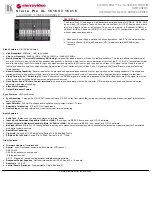
70
Figure 24 IGP shortcut and forwarding adjacency diagram
170B
Make-before-break
Make-before-break is a mechanism to change an MPLS TE tunnel with minimum data loss and
without using extra bandwidth.
In case of tunnel reoptimization, traffic forwarding is interrupted if the existing CRLSP is removed
before a new CRLSP is established. The make-before-break mechanism ensures that the existing
CRLSP is removed after the new CRLSP is established and the traffic is switched to the new CRLSP.
However, this wastes bandwidth resources if some links on the old and new CRLSPs are the same.
This is because you need to reserve bandwidth on these links for the old and new CRLSPs
separately. The make-before-break mechanism uses the SE resource reservation style to address
this problem.
The resource reservation style refers to the style in which RSVP-TE reserves bandwidth resources
during CRLSP establishment. The resource reservation style used by an MPLS TE tunnel is
determined by the ingress node, and is advertised to other nodes through RSVP.
The device supports the following resource reservation styles:
•
FF
—Fixed-filter, where resources are reserved for individual senders and cannot be shared
among senders on the same session.
•
SE
—Shared-explicit, where resources are reserved for senders on the same session and
shared among them. SE is mainly used for make-before-break.
As shown in
707H
Figure 25
, a CRLSP with 30 M reserved bandwidth has been set up from Router A to
Router D through the path Router A—Router B—Router C—Router D.
To increase the reserved bandwidth to 40 M, a new CRLSP must be set up through the path Router
A—Router E—Router C—Router D. To achieve this purpose, RSVP-TE needs to reserve 30 M
bandwidth for the old CRLSP and 40 M bandwidth for the new CRLSP on the link Router C—Router
D. However, there is not enough bandwidth.
After the make-before-break mechanism is used, the new CRLSP can share the bandwidth reserved
for the old CRLSP. After the new CRLSP is set up, traffic is switched to the new CRLSP without
service interruption, and then the old CRLSP is removed.
















































